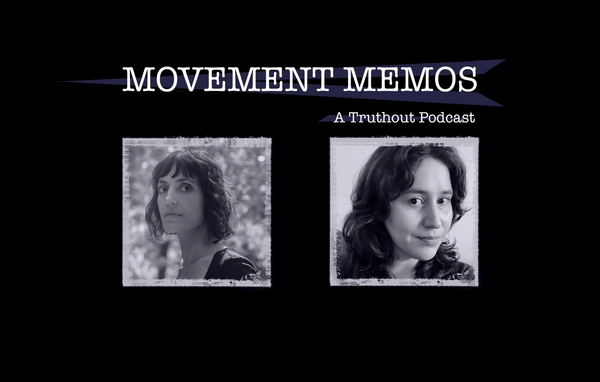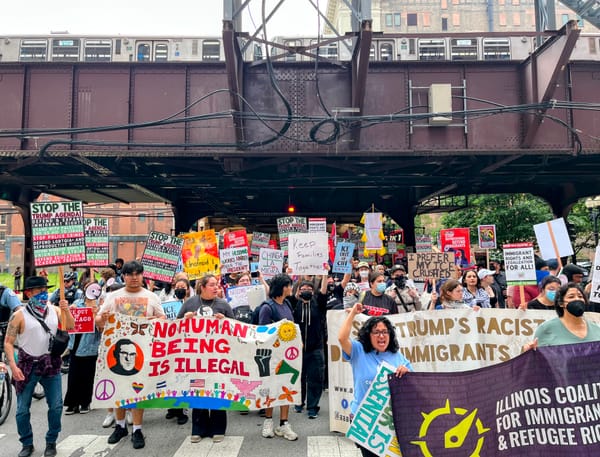Why Trump’s Conviction Does Not Complicate My Abolitionist Politics

I was walking to the grocery store on Thursday when an elated driver yelled out their car window at me, “Trump is guilty!” That is how I learned that former president Donald Trump had been convicted of 34 felony charges.
As I continued to walk down the street, I was greeted by a woman who was raising an American flag outside her home. “Trump’s a felon!” she declared.
“So, I’ve heard,” I said.
She went on to explain that she had raised the flag on her porch on 9/11 and on the day Richard Nixon resigned, and that she was raising it again today.
As my group chats reacted to the news that Trump had been found guilty with jokes and questions about what comes next, a friend said to me, “I guess you were wrong.”
Puzzled, I asked, “What was I wrong about?”
“That he would be convicted,” she said.
I had to remind her that I never took a position on the outcome of the trial. I know as well as anyone that juries are unpredictable, and that Trump is undoubtedly guilty of many crimes. I have, however, previously stated that I don’t believe Trump is going to prison because prisons simply don’t exist to house men like him. I still believe that he is unlikely to spend time in prison, and a number of legal experts agree, but ultimately, predictions about whether Trump is eventually incarcerated are not the point.
I saw a post on Bluesky on Thursday in which someone lamented that it was a hard day to be a prison abolitionist. I am not sure if they meant that it was a hard day because there was a part of them that wanted to celebrate alongside other posters, or whether it was hard for them to see the term “felon” bandied about as though it were proof of someone’s inferiority or unworthiness. Perhaps it was difficult to see people raising a glass to the system and declaring that “no one is above the law.” I couldn’t say. My biggest concern when people are celebrating high-profile convictions is typically that those verdicts offer false reassurances that the injustice system “works,” and that carcerality can save us.
It’s true that most people with felony convictions do not deserve to be associated with Trump, or to be depicted as fundamentally undeserving of care and consideration. However, I doubt there will be any dissuading people from throwing the word “felon” around in the coming months, as though it has the power to cast a hex on Trump’s name that the words rapist, white supremacist, and fascist (all of which clearly apply to him) have not. People whose political lives are limited to the act of voting and yelling at people about voting tend to flex their worst qualities during election years. ‘Tis the season.
In moments like this one, a lot of people who identify as prison abolitionists try to carve out exceptions. They may say things like, “I am a prison abolitionist, but…” before explaining why they are savoring a particular conviction. I will admit that there are moments when I have conflicted feelings, in the wake of a guilty verdict. Those feelings are human. They are not the result of a sudden flurry of faith in the system, or of a belief that a torturous system that manufactures premature death for millions of people is occasionally worthwhile. Those moments when my emotions do not necessarily align with my beliefs are the product of a basic desire to see something ugly to happen to someone who has caused great harm. They are vengeful emotions born of a desire for satisfaction. In my politics, I do not equate justice with satisfaction, nor do I believe my knee-jerk emotions should dictate people’s fates.
When I think about whether prison is “justice,” I am not thinking about wealth-anointed politicians and celebrities. I am thinking about the people that prison was created to target and disappear from society, people who are being sexually assaulted, deprived of potable drinking water, functional medical care, and even sunlight. Police and prisons maintain the power and property of the ruling class, and serve as disposal systems for people who serve no economic purpose under capitalism. While some people entertain fantasies that the wealthy might be equally subject to carceral horrors, capitalists propel us toward global annihilation and lobby for the criminalization of homelessness.
When I talk about criminalization, abolition, and Trump’s legal woes, I am not focused on the former president’s well-being. As an organizer, I am concerned with how people make sense of the world and how high-profile cases figure into that sense-making. I also don’t begrudge people their schadenfreude when a man as horrible as Trump has a very bad day. When Trump had COVID, I rooted for the virus. As someone who is deeply worried about Trump’s transphobic, ethno-nationalist politics, I am concerned that people will assume his conviction, and their avid use of the word “felon,” will shape people’s electoral decisions.
The people who are inclined to vote for Trump have been further galvanized by this verdict. They see the legal attacks on Trump as evidence that they, their beliefs, and their position in this society are under attack and must be fought for. They are more likely to show up to the polls and more likely to commit acts of violence in Trump’s name. I am not suggesting that our actions should be guided by right-wing threats of reprisal — merely that we should be realistic about the right’s well-established potential for violence.
While this moment has generated satisfaction for many, the terrain of injustice we are navigating remains unchanged. As my friend, author Sarah Kendzior, told me after the verdict, “The victims of Trump’s decades of crimes — everyday Americans — are no safer than they were before yesterday, nor have there been any meaningful consequences for Trump.” Sarah pointed out that the most immediate consequences of this trial could befall the presiding judge or members of the jury. “That is yet another indicator that we live in a mafia state, which is nothing to celebrate,” she said. “It was a mafia state under Trump, and it remains a mafia state under Biden, and the seeds of corruption were sown long before either of them entered office.”
We live in a country that is currently facilitating the genocide of Palestinians in Gaza. Among those who rule us, and those who are poised to do so, there is no moral high ground to fight over. I have no desire to experience a Trump presidency, but do I see any moral redemption for the United States in his conviction? As Sarah told me, “We are in a situation where the government has neither moral nor solid legal standing.”
Regardless of my disgust for Joe Biden, and the political machinations of both major parties, I have no desire to live through another Trump presidency. Even without a conviction, Trump has clearly demonstrated his ability to sanction the deaths of hundreds of thousands of people and dismantle the living conditions of many, many more. Trouncing him in the polls should not be a difficult task. However, Biden has chosen to fund and support a genocide. Would-be voters are watching people burn alive in their tents and staring at images of children ripped apart by bombs. The psychological damage of watching a father collect the pieces of his child’s severed body is not undone by calling Trump a “felon.”
What is the political power of criminalization in an election year when President Biden is indifferent to an order from the International Court of Justice declaring that Israel must halt its offensive in Rafah “in conformity with its obligations under the Convention on the Prevention and Punishment of the Crime of Genocide”? Given that we are faced with two candidates who fully support the crime of genocide, there is no moral reckoning to be found in the resolution of a case about falsified documents and the coverup of scandalous sexual encounters. Unfortunately, we are accustomed to equating satisfaction with justice in this country, and demanding far too little in the way of transformation.
This piece was published in Truthout today and is shared here with permission. Sarah Kendzior had more to say when we talked about Trump's conviction on Friday, and I will share the rest of her commentary with you via this newsletter tomorrow.




